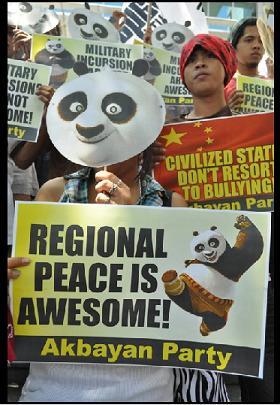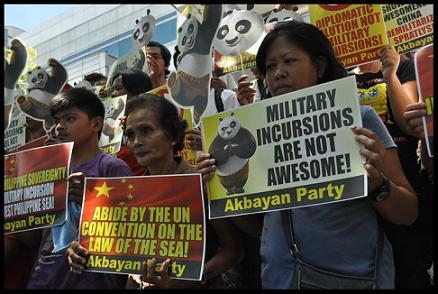A Negotiated Political Settlement to the Spratly Islands Dis
Party of the Laboring Masses (PLM) - 22.06.2011 09:58
No to Sabre-Rattling! The Party of the Laboring Masses - Philippines condemns any actions that increase military tensions in the region and contribute to a regional military conflict, by countries that lay claim to the Spratly Islands. We are opposed to any sabre-rattling and stand for a negotiated, political settlement, of the disputed claims to the area. Therefore we deplore China’s strong-arm tactics and bullying, which undermines efforts towards a peaceful, political settlement, of the disputed claims.


The Spratly Islands, less than four-square kilometres of land area spread over 425,000 square kilometres of sea and usually submerged under water, probably have strategic importance fuelling the numerous territorial disputes. The area holds significant reserves of oil and natural gas: reportedly some 17.7 billion tons of oil and natural gas reserves, larger than the 13 billion tons held by Kuwait, thus making it the fourth largest reserve bed in the world. In an energy hungry world, these reserves intensify the disputed claims over the area. Due to clashes over claims on the islands, no successful exploration of the area has as yet been successfully undertaken. It is a productive area for world fishing and accounted for 8% of the total world catch in 1988, a number which has most likely risen since then. China has estimated that the South China Sea holds one trillion dollars worth of oil, natural gas and fishing. The region is also one of the busiest shipping lanes in the world. Tanker traffic through the South China Sea is over three times greater than through the Suez Canal and five times greater than through the Panama Canal.
The history of the various claims is lengthy and contorted. Malaysia has militarily occupied three islands that it considers to be within its continental shelf. Swallow Reef (Layang Layang) has been turned into an island through land reclamation and the establishment of tourist facilities. China and Taiwan claim that the islands have historically been a part of China for nearly 2000 years, discovered during the Han Dynasty in 2 BC and marked on maps compiled from thereon. China also claims that neighbouring countries and European Powers took advantage of China’s situation during the revolutionary upheavals to impinge on its sovereignty. Today, China’s Peoples Liberation Army and the Taiwanese government armed forces are both stationed in several islands, including the largest, Taiping Island. Vietnam disputes China’s claims on the basis that the ancient Chinese records were about non-Chinese foreign territories and that China did not claim sovereignty over the Spratlys until after the Second World War. Vietnam claims the Spratlys based on international law on declaring and exercising sovereignty. Vietnam currently occupies 31 islands. Brunei's claims to the reef are based on the United Nations Law of the Sea. Brunei claims that the southern part of the Spratly Chain is actually a part of its continental shelf and therefore a part of its territory and resources.
The Philippines bases its claims of sovereignty over the Spratlys on the issues of Res nullius (literally ‘nobody’s property’) and geography. The claim was Res nullius as there was no effective sovereignty over the islands until the 1930s when France and then Japan acquired the islands. When Japan renounced their sovereignty over the islands, according to the San Francisco Treaty between Japan and the Allied powers signed in 1951, there was a relinquishment of the right to the islands without any special beneficiary. Therefore, argue the Philippines, the islands became Res nullius and available for annexation. The Philippines did not register these claims until the 1970s and annexed the islands in 1978, calling them the Kalayaan Island Group. The cornerstone of the Philippines claim of the Kalayaan islands is that the Spratlys lie within its 200-mile Exclusive Economic Zone according to the 1982 United Nations Convention on the Law of the Sea. The Philippines also argues, under maritime law that China cannot extend its baseline claims to the Spratlys, because China is not an archipelagic state.
There are many geopolitical interests at play in the area. These include that of the United States, which has stated that it has ‘national interests’ in the South China Sea. The strategic importance of these islands, in a world faced with rapidly dwindling natural resources and increasingly precarious food security, are fuelling the disputes over territorial claims in this region. In a region which has had more than its share of war and conflict, due to colonial and imperialist aggression, we must reject all and every response which escalates military tensions in the region. We must stand for a negotiated, political resolution, to the disputed territories.
Furthermore, we do not believe the argument that the national sovereignty of the countries involved is at stake over the disputed claims, helps achieve this. The issue of national sovereignty is legitimate only if there are national islanders, i.e. an actual islander population inhabiting these islands, whose economic interests and culture historically coincide with the interests of a nation state, but this is not the case. Only a small number of military personnel occupy some of the islands. Sovereignty cannot be solely defined as authority over territories. The Spratlys is simply a disputed territory and therefore must be resolved through straightforward negotiations. To argue, as the various governments do, that national sovereignty is at stake or is being violated is not strictly accurate. It is also dangerous as it raises the stakes and therefore increases regional tensions around the issue.
We also oppose any attempts by the Philippine government and the defense department to purchase military equipment ‘to better address the Spratlys issue’, as described by AFP spokeman Commodore Rodriguez. In a country that continues to face an armed liberation movement struggling for self-determination of the Bangsamoro people in Mindanao, as well as a guerrilla warfare undertaken by left groups in pursuit of social justice, any ‘nationwide modernization upgrade’ as proposed by the AFP will inevitably be used by the government against the legitimate struggle of the Bangsamoro peoples and the left. Therefore, any moves by the AFP to purchase weapons under the guise of ‘national defence’ must also be opposed.
Partido Lakas ng Masa (PLM)
 http://www.masa.ph/ http://www.masa.ph/
___________________________________________________________________________
Akbayan urges Chinese Gov’t: Demilitarize contested Spratly areas
By AKBAYAN (Citizens Action Party)
Around a hundred members from Akbayan Party protested outside of the Chinese Consular office inMakati Thursday morning to condemn the Chinese government’s military incursions into the West Philippine Sea even as they called for a peaceful resolution of the conflict and demilitarization of contested areas.
Wearing masks of the popular cartoon character Po from the popular Kung Fu Panda cartoon movie, the protesters said the gentle and happy cartoon protagonist in the fantasy world version of China is a hero who goes against bullies and those who upset the peace—something, which they asserted, the Chinese government is guilty of behaving like in the West Philippine Sea.
“We reiterate our call to the Chinese government to respect our sovereignty over the West Philippine Sea and refrain from making further military incursions,” Akbayan Rep. Walden bello said.
The partylist lawmaker said that with the rising tension in the area, involved country governments should take the lead in diffusing the tension by scaling down in military presence and work for the eventual demilitarization of contested areas.
“It’s just proper that all claimants go back to using diplomatic channels and demilitarize contested areas. As the saying goes, ‘you can’t talk peace and have a gun.’ However, in order to begin that process, there should be no further incursions into areas occupied by other claimants. China, being the biggest in the area and having the strongest armed forces among the claimants should show some magnanimity and set the first example,” Bello said.
Bello also disapproved of the Chinese government’s absolutist claims to the contested area.
“Offensive”
“Based on legitimate reports, the Chinese navy intruded into Philippine waters. Instead of apologizing and harmonizing future actions, they called on the Philippines and other claimants to respect their supreme sovereignty over the entire West Philippine Sea and refrain from making statements that are deemed irresponsible and incendiary. I think this is very offensive,” Bello said.
Bello claimed that the actions and statements of China are worlds apart.
“Saying that all claimants should return to the negotiating table is a step in the right direction. However, such statements seem to remain as mere statements especially with the strong military presence of the Chinese government in our territory,” Bello said.
US intervention, unnecessary
Akbayan also called on the United States government not to intervene in the issue saying it is a regional matter that should be addressed by the parties involved.
“The crisis started when a strong military power in the area threw its weight around instead of settling things in a diplomatic manner. We don’t need the US doing the same thing here since it will just complicate the matter even further. It would be best for the US to concentrate on its own affairs,” according to Bello.
Bello, together with fellow Akbayan lawmaker Kaka Bag-ao, filed a resolution urging the government to change the name South China Sea to Western Philippine Sea for areas that are within the EEZ of the Philippines. The Department of Foreign Affairs and the Department of National Defense have likewise followed Akbayan’s lead in referring to the South China Sea as the West Philippine Sea.
The West Philippine Sea, which contains all the area claimed by the Philippines under the UN Convention on the Law of the Sea (UNCLOS), to which it is a signatory to has been a flashpoint in regional affairs with 6 countries claiming a part or all of the area.
The UNCLOs provides an exclusive economic zone (EEZ) 200 hundred nautical miles from the baseline of countries. Under this treaty, a country has sole exploitation rights over its own EEZ. The Spratlys are an estimated 700 nautical miles from the baseline of China.
 http://www.akbayan.org.ph/ http://www.akbayan.org.ph/
|



